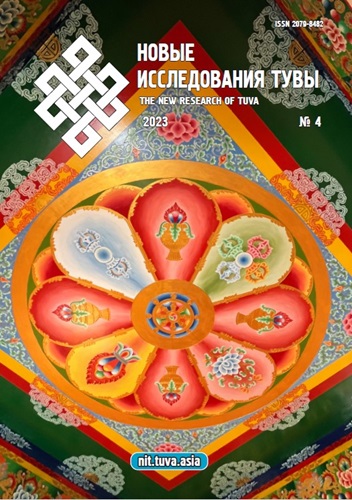Memory category according to the Russian and Tuvan languages
DOI:
https://doi.org/10.25178/nit.2023.4.10Keywords:
memory category; linguistic conceptualization; metaphor; Russian language; Tuvan languageAbstract
The article is dedicated to delineating the most productive metaphorical models within the memory category and the linguistic modalities employed for its articulation in both Russian and Tuvan languages. The study is conducted within the theoretical framework of conceptual metaphor. The objective of the research is to ascertain the metaphorical models intrinsic to the memory category and to elucidate the linguistic mechanisms underpinning their expression in the Tuvan and Russian linguistic contexts. The focus of the investigation is directed towards lexical items, encompassing both individual words and phrases, that are utilized in the articulation of the memory category. Due to the absence of a dedicated term for “memory” in the Tuvan language, with semantically proximate substitutes such as “bash”, “ugaan”, “ugaan-bodal”, and “medel” (Russian equivalents: head, mind, intellect, consciousness), the nomenclature “category” is adopted herein to facilitate a comparative analysis of the mental lexicon pertaining to memory across the two languages. Despite their genetic dissimilarity and typological structural variance, these languages manifest ethnically specific characteristics in the conceptualization of the mental lexicon associated with memory among their respective speakers. The primary source material for this inquiry consists of lexicographic references.
The narrative delineates diverse metaphorical models of memory and undertakes a comparative scrutiny of lexical expressions encapsulating these models in both Russian and Tuvan languages. Illustrative instances include the conceptualization of memory as a receptacle, as evidenced in Russian idioms like “derzhat' v pamiati” and their Tuvan equivalents, such as “saktyp alyr” or colloquially “bashka tudar” signifying ‘to remember’ — literally translating to ‘to hold in the head’. Analogously, comparisons are drawn between Russian expressions like “ryt'sia v pamiati” and Tuvan phrases like “bash ishtin kaskannaar” conveying ‘to dig in the head’, among others. The concluding segment of the study synthesizes observations regarding ethnospecific idiosyncrasies inherent in the representation of the memory category. Instances include the conceptualization of memory as a vertical repository, elucidated through Russian linguistic constructs like “oselo v pamiati” (‘imprinted in memory’) and “vsplylo v pamiati” (‘surfaced in memory’). A parallel is drawn with Tuvan linguistic expressions such as “bash dydyk taar deg bolgan” or “bash üttüg-taar bolgan” signifying ‘memory has become damaged’ — literally denoting ‘head has become perforated like a canvas bag used for straining sour milk in making cottage cheese’.
References
Apresian, Yu. D. (1995) Obraz cheloveka po dannym iazyka: popytka sistemnogo opisaniia [The image of a person according to language data: an attempt at a system description]. Voprosy iazykoznaniia, no. 1, pp. 37–67. (In Russ.).
Apresian, Yu. D. (2001) Sistemoobrazuiushchie smysly «znat'» i «schitat'» v russkom iazyke [The system-forming meanings of “know” and “count” in Russian]. Russkii iazyk v nauchnom osveshchenii, no. 1, pp. 5–26. (In Russ.).
Arsen'eva, I. A. (2022) Rekonstruktsiia metaforicheskoi kontseptualizatsii sushchestvitel'nykh s abstraktnoi semantikoi [Reconstruction of metaphorical conceptualization of nouns with abstract semantics]. Philological Sciences. Scientific Essays of Higher Education, issue 6, pp. 31–42. (In Russ.). DOI: https://doi.org/10.20339/PhS.6-22.031
Bondareva, L. M. (2009) K metaforike pamiati (staticheskii i dinamicheskii aspekty) [To the metaphor of memory (static and dynamic aspects)]. Voprosy kognitivnoi lingvistiki, no. 4, pp. 70–78. (In Russ.).
Bragina, N. G. (2007) Pamiat' v iazyke i kul'ture [Memory in language and culture]. Moscow, Yazyki slavianskikh kul'tur. 520 p. (In Russ.).
Golikova, T. A. (2011) «Pamiat'» ili «vospominanie»: russko-tiurkskie lingvokul'turologicheskie sootvetstviia [“Memory” or “remembrance”: Russian-Turkic linguistic and cultural correspondences]. In: Yazykovoe bytie cheloveka i etnosa: psikholingvisticheskii i kognitivnyi aspekty [Linguistic existence of a person and an ethnic group: psycholinguistic and cognitive aspects] / ed. by V. A. Pishchal'nikova. Issue 18. Moscow, Institut nauchnoi informatsii po obshchestvennym naukam RAN. 262 p. Pp. 30–37. (In Russ.).
Zalizniak, A. A., Levontina, I. B. and Shmelev, A. D. (2012) Konstanty i peremennye russkoi iazykovoi kartiny mira [Constants and variables of the Russian language picture of the world]. Moscow, Yazyki slavianskikh kul'tur. 696 p. (In Russ.).
Iomdin, B. L. (2010) Mental'naia leksika: pamiat' i ee funktsionirovanie [Mental vocabulary: memory and its functioning]. In: Prospekt aktivnogo slovaria russkogo iazyka [The prospectus of the active dictionary of the Russian language] / ed. by Yu. D. Apresian. Moscow, Yazyki slavianskikh kul'tur. 784 p. Pp. 465–495. (In Russ.).
Kiseleva, L. A., Todosienko, Z. V., Lukmanova, R. R. and Kuular, E. M. (2022) Metafora kak sredstvo vizualizatsii ob’ekta naimenovaniia v mediatekstakh (na materiale russkogo, angliiskogo, tatarskogo i tuvinskogo iazykov) [Metaphor as a means of visualizing an object of naming in media texts (a case study of the Russian, English, Tatar and Tuvan languages)]. New Research of Tuva, no. 4, pp. 243–256 (In Russ.). DOI: https://doi.org/10.25178/nit.2022.4.18
Kubriakova, E. S. (1991) Ob odnom fragmente kontseptual'nogo analiza slova pamiat' [About one fragment of the conceptual analysis of the word memory]. In: Logicheskii analiz iazyka. Kul'turnye kontsepty [Logical analysis of the language. Cultural concepts] / ed. by N. D. Arutiunova. Moscow, Nauka. 212 p. Pp. 85–91. (In Russ.).
Kiuseva, M. V., Kimmel'man, V. I. (2019) Metafory v zhestovykh iazykakh: glagoly emotsii i mental'noi sfery v russkom zhestovom iazyke [Sign Language Metaphors: Verbs of Cognition and Emotions in Russian Sign Language]. Voprosy iazykoznaniia, no. 5, pp. 120–134. (In Russ.). DOI: https://doi.org/10.31857/S0373658X0006288-5
Lakoff, Dzh. and Dzhonson, M. (1990) Metafory, kotorymi my zhivem [Metaphors that we live by]. In: Teoriia metafory [Metaphor theory] / ed. by N. D. Arutiunova and M. A. Zhurinskaya. Moscow, Progress. 511 p. Pp. 387–416. (In Russ.).
Revzina, O. G. (2006) Pamiat' i iazyk [Memory and language]. In: Kritika i semiotika [Criticism and semiotics] / ed. by I. V. Silant'ev. Issue 10. Novosibirsk, Novosib. gos. un-t. 191 p. Pp. 10–24. (In Russ.).
Teliia, V. N. (1988) Metafora kak model' smysloproizvodstva i ee ekspressivno-otsenochnaia funktsiia [Metaphor as a model of meaning production and its expressive and evaluative function]. In: Metafora v iazyke i tekste [Metaphor in language and text] / ed. by V. N. Teliia. Moscow, Nauka. 176 p. Pp. 26–51. (In Russ.).
Turovskii, V. V. (1991) Pamiat' v naivnoi kartine mira: zabyt', vspomnit', pomnit' [Memory in a naive picture of the world: forget, remember, remember]. In: Logicheskii analiz iazyka. Kul'turnye kontsepty [Logical analysis of the language. Cultural concepts] / ed. by N. D. Arutiunova. Moscow, Nauka. 204 p. Pp. 91–95. (In Russ.).
Khrakovskii, V. S. (2016) Glagoly pamiati: semantika, pragmatika, sintaksis [Memory verbs: semantics, pragmatics, syntax]. Russkii iazyk v nauchnom osveshchenii, no. 2 (32), pp. 9–31. (In Russ.).
Kövecses, Z. (2017) Conceptual metaphor theory. In: The Routledge handbook of Metaphor / Semino, E., Demjén, Zs. (eds.). Oxford, Routledge [online] Available: https://www.researchgate.net/publication/311403391_Conceptual_metaphor_theory (access date: 05.09.2023).
Published
How to Cite
For citation:
Arsenyeva I. A., Pomortseva N. V., Kuular E. M. and Sheverinova O. V. Kategoriia pamiati po dannym russkogo i tuvinskogo iazykov [Memory category according to the Russian and Tuvan languages]. New Research of Tuva, 2023, no. 4, pp. 139-152. DOI: https://doi.org/10.25178/nit.2023.4.10
Issue
Section

This work is licensed under a Creative Commons Attribution-NonCommercial 4.0 International License.

Author(s) license holder(s) grant rights for their work to the journal (grantee of a license) under the simple non-exclusive open license in accordance with Art. 1286.1 «Open license for a research work, work of literature or fine arts», Civil Code of the Russian Federation.
New Research of Tuva publishes articles under the Creative Commons Attribution-NonCommercial license (CC BY-NC).
Since it is an open license, author(s) reserve the right to upload the article to their institutional repository, submit it to another journal (if it allows republications), or republish it on their own website (in full, or in part).
However, several conditions apply here:
a) The republished version must always contain the name(s) and affiliation(s) of the author(s), the original title and the hyperlink to the original version on the New Research of Tuva website;
b) It must be in open access, free of charge, and no category of readers must be in any way whatsoever advantaged over general readership.
c) should the contribution be submitted elsewhere by its author(s) without substantial modification (30% or more of original text unchanged), the body of the article should contain a disclaimer that the original version was published in New Research of Tuva (with a link to the respective page)
The CC-BY-NC is a non-revocable license which applies worldwide and lasts for the duration of the work’s copyright.












